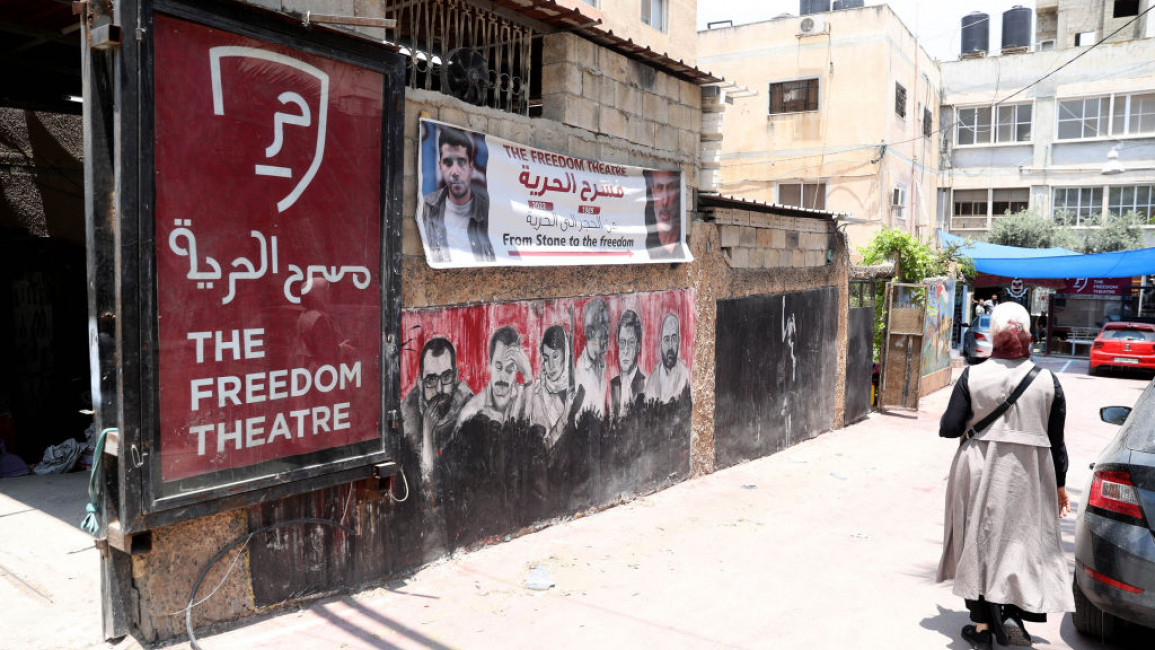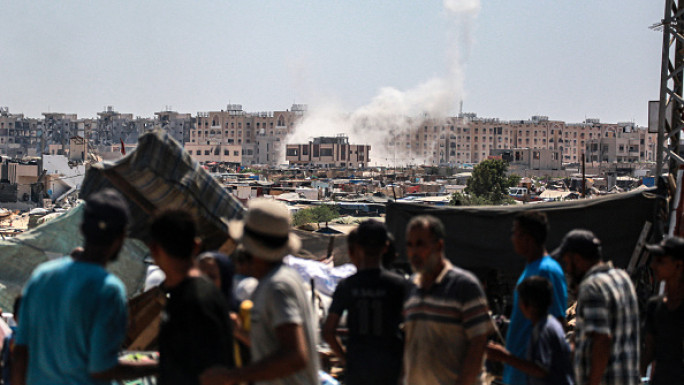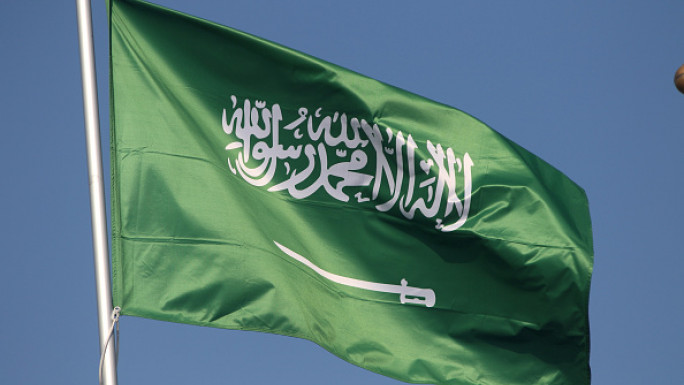
Gaza genocide one year on: From Palestine to UK, artists are fighting to bear truth
This week marks a year of genocide, there is no time to grieve or comprehend the atrocities: Israel is “escalating to de-escalate,” expanding its massacres to Lebanon, as their Western-backed funders cheer for an encore.
Palestinian writers, journalists, artists and their allies have worked tirelessly to capture the magnitude of words needed to describe unending horror, against a malevolent circus who has turned meaning upside down. In this living dystopia the role of the artist is not to create, writers to imagine, or actors to portray drama, the battle instead is to bear the truth.
Repression everywhere
Working with Palestinian artists from The Freedom Theatre in Jenin Refugee Camp, but unable to cross the Israeli-controlled border, I’ve witnessed two contrasting worlds. One by proxy, of relentless invasions—armoured jeeps, drone strikes and D9 bulldozers tearing up roads, as artists risk life and freedom to get the word out. The other an enveloping silence across UK cultural spaces, where narratives are tightly policed, freedom of expression is slowly suffocated, and the parameters to discuss Palestine pushed so far into oblivion, the real requirement is that no story be told at all.
The web ensnaring free speech is not just spun by those with open intent but reinforced by wilful ignorance, shirking responsibility, and complicity.
In a two-hour meeting with the Arts Council England, Nafeesah Butt a former employee and I use The Freedom Theatre to illustrate that Palestinian artists don’t choose a relationship with Britain—it is one imposed by violence.
The theatre's address in Jenin Refugee Camp highlights the forced displacement of 750,000 Palestinians in 1948, a consequence of the 1917 Balfour Declaration. Present-day photographs of the venue reveal scorched walls from the July 2023 bombing - one of hundreds of Palestinian cultural sites hit by missiles from aircraft and drones often made with British components. No introduction to the team is complete without noting the absence of Producer Mustafa Sheta, held for nearly nine months in Administrative Detention—a system of imprisonment without trial, rooted in British Mandate laws, designed to criminalise Palestinian resistance to colonial rule.
By cultivating a powerful new generation of artists The Freedom Theatre has chosen to respond through culture. Yet, the Arts Council England’s (ACE) new "Reputational Risk" framework warning cultural organisations of "overtly political or activist" further hinders access to British stages and audiences.
Despite outrage leading to softening the language, it continues to encourage organisations to self-police their artists, in a system that mirrors Prevent’s racist and Islamophobic approach.
Deflecting with “doublethink” reasoning, citing their role as a “arms-length government body who are also beholden to government directives”, Equity Union’s Freedom of Information request cleared up any confusion, revealing Westminster had directly discussed ‘Reputational risk relating to Israel-Gaza’ weeks before the changes were made.
Undermining free speech
Whilst it’s difficult to quantify the long-term effects of authoritarian government initiatives, there can hardly be a more absurd example of the state of free speech in British theatre than the cancelled run of Midsummer Night’s Dream at the Royal Exchange in Manchester. In a version inspired by rave culture, it was to include a mechanical rapping “Free Palestine”. Insisting the phrase must be removed, for the show to go on, they later urged “We have no issue with artists putting forward political views, but they need to be fully contextualised.”
Despite claiming to be "conversation starters and thought provokers," Art Reach also cited "contextualising the piece for audiences" as one reason to remove a virtual reality film from Journey’s International Festival this October. Created by The Freedom Theatre with artists across Palestine, it covered stories from over 100 years in just 25 minutes.
Choosing empty stages and gaps in programming, to even the smallest mention of Palestine seems a farcical approach to foster deeper conversation and understanding.
Far more aggressive, is the abuse of law which has seen two journalists recently arrested under the Terrorism Act, and legal campaigns target artists' their organisations and their livelihoods.
Sending a letter to ThirdSpace Theatre in Brighton, led by British-Palestinian Tanushka Marah, UK Lawyers for Israel, claimed a breach of the Equality Act. Accusations ranged from a young person reading a piece by Jewish Poet Laureate Michael Rosen, to creating a show inspired by a poem from Refaat Alareer. Killed in Gaza on 6 December 2023, UK Lawyers for Israel, claimed that referencing kites in a context connected to Refaat was “obviously redolent of the burning kites and the machine gun-wielding paragliders”. However ludicrous, artists are left exhausted and facing huge costs defending against allegations.
Meanwhile the Israeli army continues to twist words into sinister meanings with impunity and commit sacrilege with Jewish symbols.
Operation Summer Camp
In a clear act of anti-Semitism, the Israeli army graffitied the Menorah and the Star of David on The Freedom Theatre as they ransacked and used the building as a military base in December 2023. Despite the weekly invasions artists in Jenin, continued with the annual summer camp, planning workshops in dance, circus, and performance—while also preparing enough food and water for over 50 children in the event of a siege. For a moment joy and normality triumphed, until weeks later the Israeli army invaded Jenin Camp sinisterly naming their ten-day killing spree "Operation Summer Camp”.
The largest assault since 2002, Naqaa Sammor, a 21-year-old artist, wrote updates on the “miniature scenes from Gaza”. As drones flew above and the army surrounded her house, her courage only grew stronger, describing the “screams of women and explosions” whilst challenging what she describes as worse, “the silence of this hideous world”.
When the invasion finally ended, she wrote, “I feel like we are falling short of what we can do for our country.” Of all the atrocities she had described, this somehow hurt the most. How can such an extraordinary and brave young woman, only be left with guilt?
Guilt weighs heavy on many of the young artists I work with. One actor lives between two refugee Camps in Tulkarem. Both relentlessly targeted by Israel, he describes his reality as being punched in the face from both directions: “My younger brother is in Israeli prison, my father was recently released from Palestinian Authority prison, and young men my age are being killed: am I really supposed to believe that theatre will stop them?”
I insist that only he can determine the best way to resist, that I unequivocally believe in the Palestinian right to armed struggle—a right to resist Israel’s military occupation upheld by international law. But I also want this incredible young man, full of passion, who brings laughter to everyone around him, to live, and despite all the dangers of being a Palestinian artist, it still remains a path less perilous than the certain death of taking up arms.
No longer asking for permission
As young artists grapple with how best to use their lives, words become instrumentalised and tangled in the conflicting agendas of freedom of speech organisations.
When Index On Censorship reached out to publish texts from Youth Against Invasion, they did so without mentioning their CEO Ruth Anderson had just toured Israel in a 'show of solidarity’. Pulling the work from their publication, it felt redundant to explain the contradiction of platforming young artists whose lives were at risk, while posing for photos with Israeli President Isaac Herzog—the same man who inscribed "I trust in you" on a shell bound for Palestinians.
After three members of The Freedom Theatre were taken at gunpoint by the Israeli army in December 2023, PEN International —the world’s leading defender of writers at risk—seemed an obvious ally.
It was shocking to read the overview of their Case List which featured the attacks on our team, stating: “the 7 October bloody attack by Hamas on southern Israel launched a conflict that risked a genocide in Gaza”. Utilising a basic tool of Israeli propaganda by suggesting Palestinians initiated violence, there were over 40 textbook issues around misleading frameworks and language. At no point was it mentioned that erasing of cultural identity and heritage, and suppression of those who speak out, are integral components to settler colonialism, ethnic cleansing, and genocide.
As months are stolen negotiating the smallest concessions on truth, artists have stopped asking for permission, reclaiming cultural space by occupying it and finding agency on the streets and in protest.
“We see how power uses time to expand its siege, to widen the abyss as it bulldozes toward an interminable finish… Time is bought and time is bolstered by the silence of cultural institutions” wrote Rheim Alkadhi, withdrawing her exhibition from the ICA, an institution accused of firing workers connected to a global strike and putting a statement of solidarity with Palestine on the website.
Far from leaving empty space, saying no has united artists around shared values, contributing to a Palestinian liberation movement that however diverse in tactics - from boycotts to strikes, creative protests to civil disobedience, cultural resistance to armed resistance - will always be met with manipulation, slander or violent repercussions.
As time distorts, anxiety overwhelms and fear paralyses, more news arrives from Jenin. This time the 21-year old son of Zakaria Zubeidi co-founder of The Freedom Theatre has been killed in a drone strike. The horror intensified knowing Zakaria, held in Israeli solitary confinement, will be alone when he hears the news from his jailers.
For those of us left with the freedom to speak, it’s a moment to remember why Zakaria co-founded the theatre, saying nearly two decades ago: “Through the theatre you can talk to the world and give a different message from the way we are portrayed as terrorists... Somebody needs to tell the story of the fighter: Who are they? Why are they doing what they are doing? That armed resistance is a civil uprising to defend ourselves with whatever is available.”
Now, a new generation of young people in Jenin are dying, defending their camp with the same stones and guns their fathers used before. So as history repeats its violent oppression and moral impunity breaks new ground, there is no time to falter in telling these stories.
Zoe Lafferty is associate director at The Freedom Theatre in Jenin Refugee Camp, Palestine where she is currently collaborating on the global solidarity project ‘The Revolution’s Promise’ and virtual reality film ‘In A Thousand Silences’.
Follow her on Twitter: @zoe_lafferty
Have questions or comments? Email us at: editorial-english@alaraby.co.uk
Opinions expressed in this article remain those of the author and do not necessarily represent those of The New Arab, its editorial board or staff.



![Israeli forces ordered bombed Gaza's Jabalia, ordering residents to leave [Getty]](/sites/default/files/styles/image_684x385/public/2176418030.jpeg?h=a5f2f23a&itok=0fsbI6OX)
![Netanyahu rejects Lebanon ceasefire [Getty]](/sites/default/files/styles/image_684x385/public/2163507044.jpeg?h=a5f2f23a&itok=6lngC8Kw)
![Morocco said it was ready to repatriate irregular migrants in Europe [Getty]](/sites/default/files/styles/image_684x385/public/2161211488.jpeg?h=c6d3a00b&itok=_xSSEO6D)


